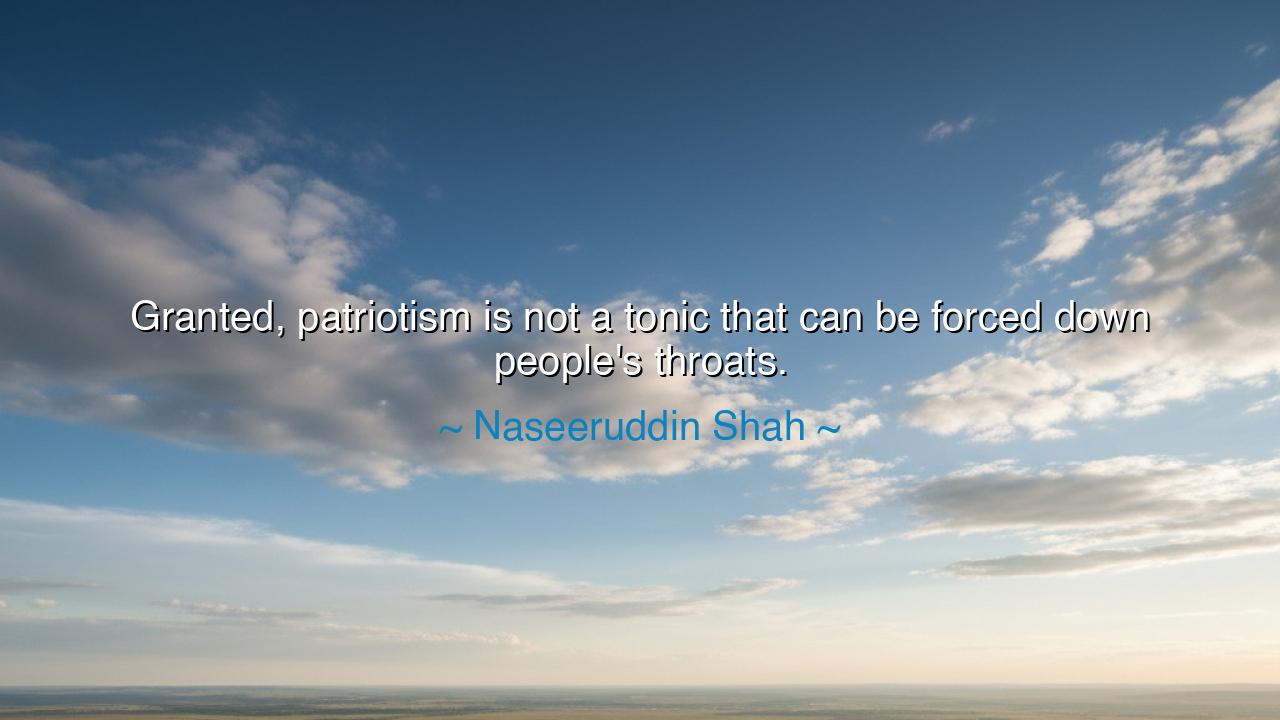
Granted, patriotism is not a tonic that can be forced down






The acclaimed actor and thinker Naseeruddin Shah once declared with clarity: “Granted, patriotism is not a tonic that can be forced down people’s throats.” In this utterance he speaks a truth that echoes across ages: patriotism is not something that can be commanded, imposed, or administered like a bitter medicine. It is not born of coercion, nor of fear, nor of slogans repeated under compulsion. Rather, it must arise freely, from the heart, as a flame of love and responsibility for one’s homeland.
The origin of this saying lies in Shah’s reflections on society and his own experiences as a public figure. In a nation of vast diversity like India, where countless faiths, languages, and traditions intertwine, he recognized that to demand uniform expressions of patriotism is to misunderstand its essence. Love of country must be natural, authentic, and self-chosen. If it is forced, it becomes hollow performance. If it is genuine, it becomes an unshakable force. His words remind us that coerced loyalty is fragile, but freely chosen loyalty is unbreakable.
History testifies to this wisdom. Consider the rule of the Soviet Union, where patriotism was demanded through propaganda, parades, and punishment for dissent. For a time, citizens complied outwardly, but when the state’s foundations crumbled, much of that loyalty vanished like smoke, for it had been compelled, not cultivated. By contrast, the Indian independence movement, led by Mahatma Gandhi, stirred patriotism not by force but by awakening people’s conscience. They embraced sacrifice, imprisonment, and even death, because their love of the motherland came from within, not from the lash of authority.
One may also recall the tale of World War II Britain, when the bombs of the Blitz fell upon London. No decree demanded that citizens stand steadfast; no law could command courage. Yet the people endured, singing in the shelters, refusing to yield. Their patriotism was not poured down their throats by force—it arose naturally from love of their way of life, their homes, and their shared identity. This is the power of voluntary devotion, the kind that cannot be broken even by fire.
The deeper meaning of Shah’s words is that patriotism is like a plant: it must be nurtured, not forced. It grows in the soil of justice, fairness, and belonging. When people feel seen, respected, and valued, their love for their country flourishes. But when they are silenced, oppressed, or compelled, resentment grows instead of loyalty. Thus, to truly foster patriotism, leaders must build societies of dignity, fairness, and inclusion.
The lesson for us is this: never confuse loud declarations with genuine love of country. True patriotism does not come from shouting the loudest or obeying under compulsion; it comes from living with responsibility, integrity, and care for fellow citizens. Do not demand of others that they prove their patriotism in prescribed ways; instead, inspire it through justice, service, and compassion.
Practically, this means we must strive to cultivate, not coerce. Teach the young the stories of their land, not through fear, but through inspiration. Serve the poor, protect the environment, strengthen your community—these are acts of patriotism greater than any slogan. Create a society where people feel that the nation is theirs, and their hearts will give their loyalty freely.
So remember, children of tomorrow: patriotism is not a tonic that can be forced down people’s throats. It cannot be demanded, only inspired; it cannot be coerced, only cultivated. Let your love of country spring from truth and justice, and let your example kindle that same love in others. For forced loyalty is brittle, but free devotion is eternal, and only the latter can bind a people together through the trials of history.






AAdministratorAdministrator
Welcome, honored guests. Please leave a comment, we will respond soon